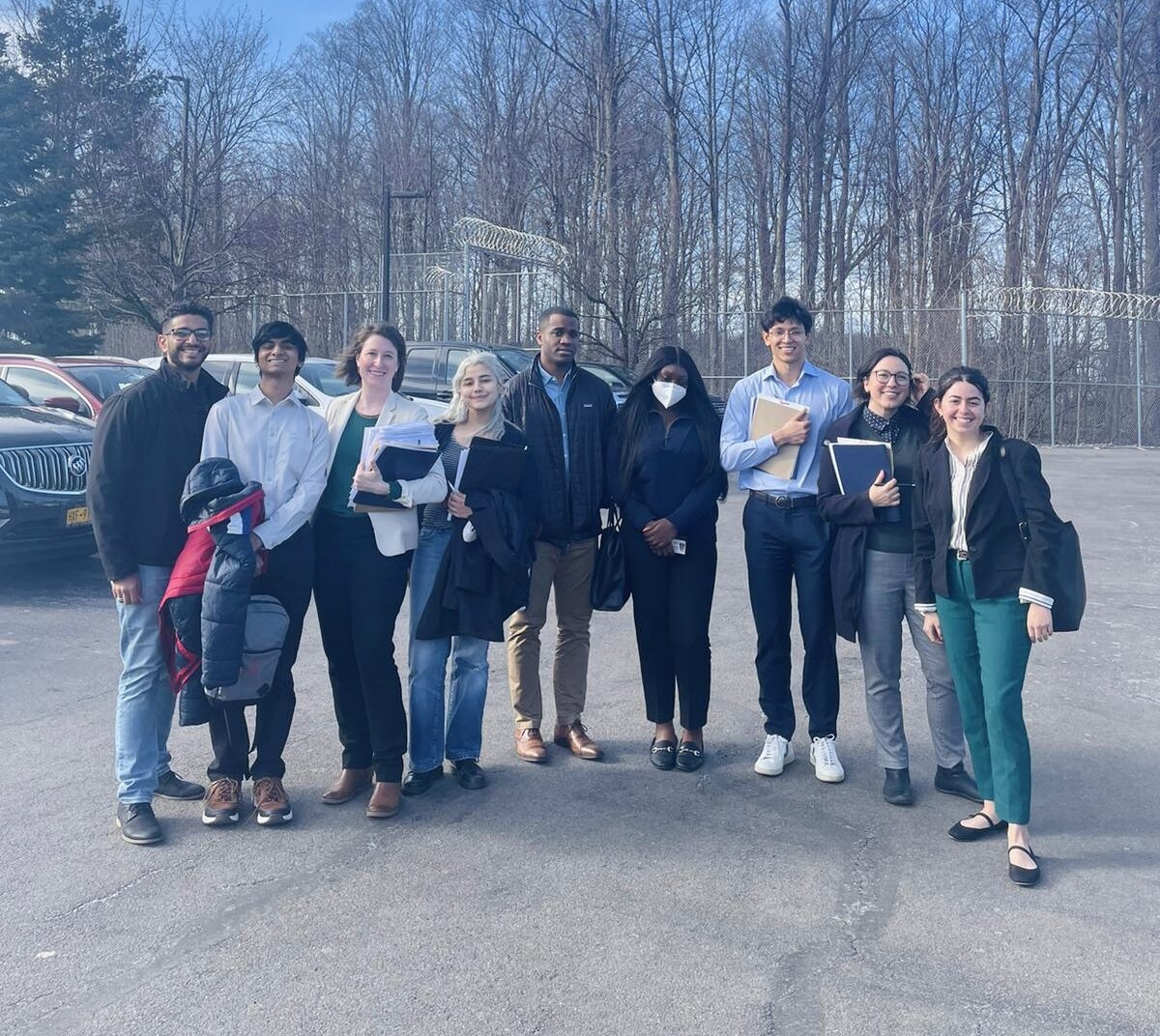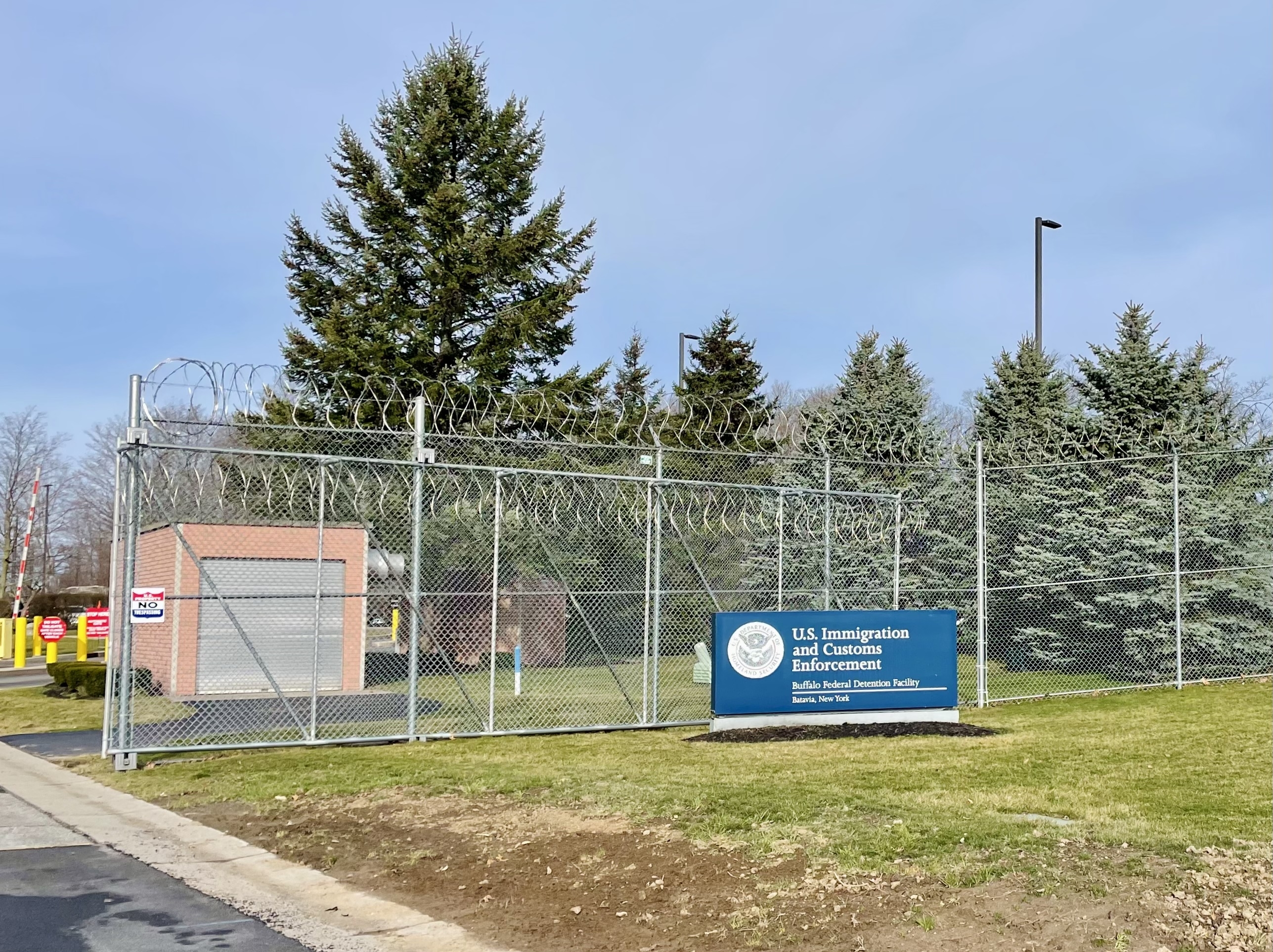This website uses cookies
We use cookies to ensure that we give you the best experience on our website. If you continue to use this site we will assume that you are happy with it.

Down a long series of hallways, through metal detectors and gates, Cornell Law students and faculty in the 1L Immigration Law and Advocacy Clinic followed an immigration detention officer to the large gymnasium where they would spend the day meeting with immigrant men in detention. In March 2024, this legal team traveled to the Buffalo Federal Detention Facility in Batavia, New York. Located about two hours away from Ithaca, the Buffalo facility holds around 500 immigrants at various stages of removal proceedings.
Once the team made its way to the echoing gym, students and partner attorneys from the New York Civil Liberties Union, Robert F. Kennedy Human Rights, and Prisoners’ Legal Services of New York spoke with clusters of immigrants gathered by language. Seated on plastic chairs organized in circles, detained people shared their experiences while students scribbled on notebooks, capturing these details by hand as no electronics are allowed. The purpose of the trip was to provide crucial legal information to individuals detained in the facility, identify and refer cases whenever possible, and collect information about vulnerable detained people that could be used for individual advocacy or broader litigation.
Immigration law presents a complex legal landscape, one that is challenging enough to navigate without the exacerbation of prolonged detention. Acknowledging this reality, clinic students spent weeks preparing for the trip—they met with co-organizers, received training on trauma-informed lawyering, and delved into the weeds of habeas petitions during clinic seminar sessions. They also developed interviewing skills and legal issue spotting through other casework for clients outside of detention which helped prepare them for the fast-paced, high-intensity experience of conducting numerous interviews in detention.
During their visit, students worked in teams alongside attorneys from the partner organizations, conducting know-your-rights presentations to help the detained men understand the legal process and options for requesting release. Additionally, students met with the men for one-on-one consults and provided individual legal advice under direct attorney supervision. The teams also encountered rare language speakers, such as those who spoke Uzbek, Tigrinya, Lingala, and Haitian Creole. Students used phone interpretation services to provide legal information in these immigrants’ best languages, something many had not experienced since arriving in detention.
For participating students, these on-the-ground experiences underscored the vital role that lawyers can play in ensuring fair outcomes for individuals in removal proceedings. Many immigrants in Buffalo detention facility had meritorious claims and compelling stories but lacked access to even very basic legal assistance and information, which ultimately resulted in negative outcomes. Their stories highlighturgent need for fair representation and true advocacy in immigration proceedings. Though New York State has allocated significant funding for pro bono legal services, the overwhelming backlog and waitlists for free counsel pose significant challenges to effective representation. Many individuals the students interviewed had been waiting months to speak with an attorney, and some had paid exorbitant amounts to private attorneys. Many individuals told the legal team they had been in the facility for months without status updates on their cases. The barriers created by lack of access to counsel were clear.
In addition to providing support to individuals in detention, the clinic also sought to spark conversations about the harsh realities of detention in the immigration system and support partner organizations’ work on conditions litigation. Many individuals the students met were eager to discuss issues they saw within the operations of the Buffalo Federal Detention Facility. Particularly concerning were reports of excessive “lock-ins,” where detained people are forced to stay inside their cells for up to eighteen hours a day with little to no privacy or opportunity for recreation. The detained immigrants also described substandard conditions that impacted their mental and physical health, such as being housed in cells with lights that remain on 24/7. Others discussed severe limitations on their ability to communicate with the facility and file grievances due to deficient and inadequate opportunities to connect with their loved ones and attorneys. Others complained of inadequate meals, explaining that their dinner on Fridays is typically just two peanut butter and jelly sandwiches.
Though held in civil confinement, the conditions and treatment many individuals reported suggest a punitive purpose. These complaints further highlight the role that advocates can play even outside of formal legal proceedings by raising awareness about the conditions of confinement and underscoring the reality that many immigration facilities essentially operate as jails, subjecting detainees to harsh and prolonged confinement without adequate oversight.
This trip provided a unique opportunity for first-year law students to gain insight into the workings of the immigration legal system at a very early stage of their legal education, illuminating the issues and inspiring further advocacy. Students had learned about issues in the immigration system throughout the semester through their other casework, but the trip to the Buffalo facility allowed them to understand the realities of the system in a deeper and more personal way. After the visit, students reflected with partner attorneys and community organizers on what they took away from the experience. They shared the heartbreaking stories they had heard and the anger that they felt, but there was also a strong sense of determination. Having seen these issues for themselves and spoken to detained people first-hand, students are even more resolved to leverage their resources, training, and education to help however they can.
The clinic thanks the Cornell Migrations Initiative and the Office of the Vice Provost for International Affairs for their generous support of this work.
